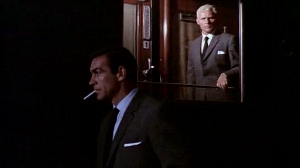
With Dr. No, Bond producers Harry Slatzman and Albert Brocoli turned one million dollars into sixty. The collision of good casting and good direction, along with enough sex appeal for most genders and orientations to get at least something out of the deal, created a sustained fusion reaction between the Cold War Era spy thriller and the kind of pulp adventures not seen (by self-conscious adults, scared their friends might think their entertainment “childish”) since before the Second World War made everyone so serious.
The studio that backed Dr. No, United Artists, called for a sequel by October, 1963, handling EON Productions a whopping two million dollars to get the job done. Is it any surprise From Russia with Love went with the Bigger Is Better and More is More philosophy that’s characterized Hollywood sequels from the very beginning? No. What’s surprising is that it worked so well, when conventional wisdom would have it sequels inherently suck. Yet this remains many people’s favorite James Bond films, including Sean Connery’s, Daniel Craig’s and Timothy Dalton’s. Who am I to snark at it?
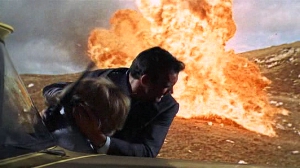
An internet-based film critic, of course. Ask a silly question…
U.S. President John F. Kennedy pretty much green lit this film in 1961, when he placed Ian Fleming’s fifth Bond novel on a personal Top Ten Books list he gave to Life magazine. The fact that From Russia with Love-the-book is a prequel to Dr. No stopped no one. So after a frantic production schedule and many a last-minute edit, the second James Bond adventure opened with Bond’s death at the hands of a blond, crew-cut slab of a SPECTRE agent named Grant (a young Robert Shaw).
It’s a fake-out of course – the first of many. But because it’s the first, it’s still cute in a kittenish way – look at the young franchise, so confident it can pull a cheap stunt like this with a straight face. All for a gasp! I admire anyone with the balls to “kill off” their hero in the first five minutes of their sequel. Certainly better than waiting around for them to quit at the start of the Second Act, like so many of this film’s decedents (especially in the superhero sub-genre…as we’ve discussed before and will soon discuss again).
There’s no quitting here, just one of those re-edits. This (first) pre-credit scene (in the series) wasn’t even supposed to be here. The filmmakers just thought it would be fun. They trusted their instincts, took a risk, and it paid off. What a concept! The same can be said for Robert Brownjohn’s title sequence – the first to project the titles over sexy women’s body parts. It foreshadows the Gypsy dance sequence later on, as well as foreshadowing how important title sequences would become to the franchise as whole. They save the title theme song for the end, though. The Bond Blueprint is not quite set. Last year’s prototype was a success. Now comes this test-type.
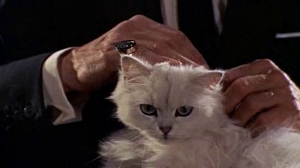
As with most test-types, it’s imperfect and prone to destructive rampages. Some kinks remain to be worked out. What was, in the novel, an already complicated plan to kill Bond and embroil his intelligence agency in an international scandal, becomes even more needlessly elaborate here in order to follow on from the events of Dr. No.
Right off the bat, we get a big steaming pile of exposition from unseen SPECTRE head Ernst Blofeld (Anthony Dawson), his Number 3, defected Russian Rossa Kelb (Lotte Lenya) and his Number 5, the chess master Kronsteen (Vladek Sheybal). This serves to catch everyone up in case they missed Dr. No and lay out the plot of the film in case they’re too dumb to follow along. It contains a conversation about fighting fish that’s been parodied into infinity and beyond, as has Blofeld’s fetish for white cats and his penchant for killing subordinates who disappoint him. It’s a spectacularly shaky way to start a movie, only a few steps removed from droning opening narration. It points toward the best and worst thing about From Russia with Love: it’s the rare Bond film that gets better as it goes along.
In any case, Kronsteen’s plan involves luring Bond to Instanbul by ordering Kleb to order a young cipher clerk at the Russian consulate to pretend to defect. (Seems simple and straightforward when you cram it all into a sentence like that.) Said clerk, Tatiana Romanova (Daniela Bianchi) will dangle a super-secret (fake) Russian decoding machine – the Lector – in front of the British…who will, of course, see the whole thing for the trap it so obviously is. They’ll send their best blunt instrument – James Bond – to spring the trap, allowing Grant to strike at him from the shadows.
Bond jumps at the chance after his second visit from Maj. Boothroyd…now played (for the first time) by Desmond Llewelyn. This visitor from Q Branch (who is still not referred to as “Q”) gives Bond the trick suitcase by which all trick suitcases are still measured today, with its hidden knife, sniper rifle, and tear gas-based anti-theft device. The fifty gold sovereigns are a nice touch, too.
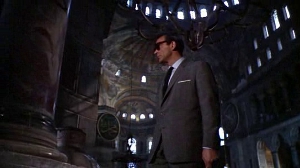
In Istanbul, we find the series moving into one of the oldest urban environments on Earth, a far cry from the beaches, dusty roads and outdoor bars of Jamaica. Yet there’s little time for travelogue footage – the local Soviet muscle, in the form of some Bulgarians, tail Bond from the moment he lands. As does Grant. This time, Bond uses a code phrase to meet his contact, preventing any of that nasty, suicidal driver business from happening again. There’s a palpable tension to most of the Istanbul stuff thanks to a believable complex – and believably nonchalant – picture the film paints of a city in the midst of intrigue. I love how cool Bond’s driver is about the fact they’re being tailed – and how shocked the local station head, Kareem Bay (Pedro Armendáriz – a great Mexican actor, playing a Turk in the last role he’d ever play in this world, sadly) is when the Bulgarian’s begin to lash out, presumably in reaction to Bond’s presence.
Neither side suspects Grant is playing both against the middle with all the silent poise of a killer robot from the future. Shaw’s blond crew-cut, hard stare, and complete nonchalance make him a perfect mirror for Bond, and the two are intentionally paralleled throughout. We meet them together pre-credits and after that, we re-meet both as they’re relaxing outdoors with hot ladies on opposite sides of the world. Both wear their suits well, looking far more like body builders than secret agents, and both carry out the orders of their separate secret agencies with similar amounts of bloodshed. Bond just so happens to commit all his murders in the service of fleeing Istanbul with Tatiana (and the Lector). After some initial setbacks, bombings, gunfights, one catfight, and at least two minutes of gratuitous bellydancing, Our Hero and his Girl board the Orient Express.
You can see where all the extra money went: into location shooting inside places like the Hagia Sophia, a sixteen hundred and fifty year-old monument to Byzantine grandiosity that was one of the holiest sites on Earth for those first fifteen hundred and seventy-one years. Or the money went into staging the elaborate dance/fight sequence at the Gypsy camp, where we learn Bond’s “heart is not strong enough to be a real Gypsy.” For whatever reason, he calls in a Gypsy Leader’s life-debt to stop a cat-fight that was meant as the centerpiece of the night’s entertainment. Why? What manner of hypocrisy keeps James Bond – of all people – from appreciating a good cat-fight? How much can a girl know about herself, she’s never been in a fight? Do you want them both to die without any scars? You’ve got quite the prominent one on your back, Jimmy (at least in this movie). Would you rather not have that reminder visibly etched into his skin? (And is it a relic of the six-month hospital stay hinted at in Dr. No? Or from Dr. No himself? Maybe we’ll find out in the future…I know we won’t, but it’s fun to dream sometimes, isn’t it?)
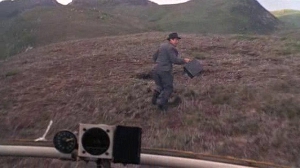
Money also went into the two elaborate chase sequences that end the film, involving a helicopter and multiple speed boats. The Bond vs. helicopter sequence was such a hit, helicopters became a franchise staple in and of themselves. It still looks a little North by Northwest to me, but if Terrance Young’s going to rip someone off, it might as well be the Master of Suspense. Bond films were still technically “suspense thrillers” at this point, so most of the big action stuff takes place at the end. The explosions put a nice pin in everything, just like in Dr. No, rather than dominating everything, as they do for so many action movies today.
The real thrills come from watching Bond outwit ordinary people as he stalks and is stalked through the streets of Turkey, or the claustrophobic corridors of the Orient Express. The best action in the film takes place in Bond’s train compartment, where he and Grant finally square off. It’s a clumsy, rough, fight between two professional killers in a space where neither have room for anything flashy, and its tenser than a thousand massive shoot outs between competing good guy and bad guy armies.
In fact, let’s back up for a moment. About halfway through the film, Bond and Kareem Bey – who’s a far more interesting Bond ally than our old pal Quarrel (he gets a backstory as a circus performer and everything) – attend dinner a gypsy camp. The camp’s invaded by Bulgarian heavies in league with the Russians who’ve been stirred up by Grant. Dozens of armed thugs pour in. Every able-bodied gypsy rises to defend themselves. Gunfire, knives, horses, and torches start flying everywhere. Yet Bond escapes all this with nary a scratch. It’s a nice spectacle – with lots of color, good geography, and stable direction – but action scenes should change things for our main character. It changes things for Kareem Bey – he gets shot in the arm and needs to kill some Russian guy in reprisal – and Bond gets a threesome with the two catfighters…but Bond could’ve probably landed that on his own, without all the carnage. Already we see the neigh invulnerability so common to modern action heroes creeping into their progenitor, and its only his second time.
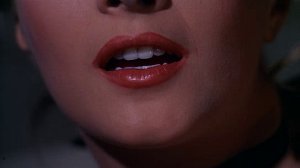
Just like last time, the Villainous Plot makes no real sense. Unlike last time, if I think about it for too long, it starts to make its own kind of sense as the apophenia kicks in. Originally I thought SPECTRE wanted the Lector decoder for themselves, and so arranged Tatiana’s defection to ensure Grant would bring it back to them after he’d killed Bond. But later in the film we learn Blofeld planned to sell the Lector right back to the Russians…which I suppose makes sense, considering Kleb’s already on their payroll. Except, if Kleb’s so valuable (she’s Number 3, after all), why is she out tromping around the field? Generals shouldn’t act like soldiers. I thought that’s the first thing they teach you in General School. Blofeld’s content to sit in his chair with his cat and his fighting fish, and he certainly lives out the movie.
I guess every SPECTRE plan has to touch on Dr. No’s “four cornerstones of power.” Tatiana’s fake defection fulfills the “Counterintelligence” quotient. Bond’s (and Grant’s) very presence in Istanbul provokes several acts of “Terrorism.” Obviously the “Revenge” would come from killing Bond. They have to sell the Lector back to the Russians or there’d be no element of “Extortion” in this plan. Were that to happen, obviously Blofeld’s psyche would collapse, causing him to stalk from office to office with an Armalite AR-10 carbine gas-powered semi-automatic weapon, pumping round after round into colleagues and co-workers.
I might as well come out and admit Daniela Bianchi’s the other thing holding me back from declaring this the “Best Bond film Ev-AHR”. She’s hot, sure, but the former Miss Rome is clearly not an actress. Even though this is her third credited film, English was not her first language. Once again our Bond Girl is dubbed over and it’s amazingly more noticeable than Honey Rider’s, especially to eyes trained by years of Japanese giant monster cinema. Whatever the language, her lines are terrible and, for most of the flick, her character’s dead weight: the one civilian in a world full of spies. Normal movies would use that as an excuse to hook us, try to get us to identify with Tatiana as a person…but she’s a girl…and a Russian one at that. So she gets to spend the whole movie going, “Oh James!” in a breathless, robotic voice that sounds like the sound I hear when I bite down on a ball of tin foil. I mollified myself by taking a shot every time she did it.
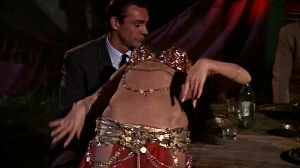
So before I pass out, let me say this movie’s still better than my nitpicks. It’s full of great action, great locations, tight direction (downright suspensful direction, at times) and most of the Bond franchise-staples that weren’t already present in Dr. No. I like to think of the two films as sides of the same coin – two potential paths this series could’ve taken. Each one’s enjoyable, but both of them are really necessary to understand why James Bond movies – and thus, most modern movies in the Action Genre – are the way they are. Many a descendent has since gone down one path or the other, ignoring the path Saltzman and Broccoli themselves chose to go down a year later, when they made Goldfinger.
![]()
![]()
![]()
![]()


Bey is my all time favorite Bond sidekick. For my money, I actually love the fight in the Gypsy camp…I like that Bond is not the center of it. Somehow it feels somewhat plausible, in its own weird way, as opposed to late in the series when everyone knows Bond and everything revolves around him, and the world would go down against a successive series of megalomaniacs and their schemes if not for this one, kinda bastardly/arrogant ass.
I loved the gypsy camp fight as well because it illustrates the violent world the Bulgarians and gypsies lived in. Also, Bond wanted the girl fight stopped because he felt enough blood was shed. In the novel, the camp leader took great offense to the request but granted it anyway.
Oh, we’re going to have some disagreements here.
I think you got Tatiana all wrong. She was little more than a tool; The “Beautiful lure” as the chapter stated in Fleming’s novel. She is a simple girl being used in a big political game and I felt her character was natural and helped that a less than competent actress played this role because they would have played the role a bit too perfectly*. She was the same in Fleming’s novel and I enjoy the little things that made her seem like a normal girl; Leaving the office and chatting to her co-workers and asking directions to Klebb’s apartment. Also, when she snuck into Bond’s hotel room, it was so clumsy that it was cute.
As for the opening exposition; I loved it. Granted, it’s not as interesting as SMERSH in the novel because they had a long and painful history with Bond and you get a very interesting look inside a real life spy killing corp. Regardless, I like this “inside SPECTRE” expose because you feel that they aren’t just a place that just has a bunch of faceless soilders, they train and kill for their leader, their god, Blofeld. And speaking Blofeld, I like how the character is forever doubtful. He listens to Kronsteen’s plan and even though he makes what seems a very convincing argument for what he has orchestrated Blofeld says “All that could be true”. I also love the fighting fish illustration and the icing on the cake when Blofeld feeds the fish to his cat. And of course, Kronsteen; what an arrogant ass ! The way he explains his plot is just like moving chess pieces as he did when first appears.
And lastly, I think Klebb was out in the field simply to maintain the look of “Brains” in the plot. Grant and the other thugs wouldn’t have appreciated this vast operation. It’s true that in the novel that Klebb only appears in the beginning and the end but that was because she was with SMERSH and Russia already maintained a presence in Istanbul; You don’t need a “brain” hovering around to see things are going okay.
Really, I think the only flaws of the film were the action sequences at the end. After that kick ass fight with Grant and Bond, it’s a huge let down to see what is little more than filler; the film could have cut to Blofeld on his yacht and straight to the hotel room in Venice and it would kept up the suspense.
* EON would strike gold once again in the same manner, They would cast non-actor Putter Smith as Kidd in Diamonds are Forever and his awkward deliver of lines actually helped bring the character to life as a creepy anti-social dominated by Bruce Glover’s Wint.
Ah well…we were bound to disagree eventually. Just wait until we get into the Roger Moore Era.
You don’t have to wait for the Moore era to get some big ass plot holes !
Don’t I know it.
I didn’t have a problem with Daniela Bianchi. One, that’s not her real voice. Actress Barbara Jefford did the voice acting, due to Bianchi’s lack of English. But body language and facial expressions are all Bianchi’s. And I believe she did a great job in conveying the character of the innocent Tatiana.
Two, I had a problem with Bond and Grant’s confrontation aboard the Orient Express. While the fight was great, although not one of my favorites, I was annoyed by the way Grant took his time in setting up Bond’s murder after pistol whipping the British agent. And while I enjoyed Shaw and Connery’s performances in that scene, Grant’s monologing struck me as stupid, following his professional behavior in most of the film.
Three, Grant was aboard the Orient Express before Bond, Tatiana and Kerim. How did he know they would be leaving Istanbul by train? And how did he know that Bond had decided to steal the Lektor a day before the date given from Bond to Tatiana?
Could someone explain why it took the Orient Express only a few hours to travel between Istanbul and Belgrade? According to the train’s schedule, it took nearly 24 hours. Both versions of “MURDER ON THE ORIENT EXPRESS” made that clear. And since this story is set during the Cold War, it should have taken the train a bit longer to travel between the two cities. Yet, in this movie, the train left Istanbul between 3:00 and 3:30. It reached Belgrade within four to five hours.
One of the action sequences in the movie’s last 20 minutes would have been fine. But two? Hmmm . . . a bit too much for me.
Ev-AHR _ a cyberword or something ?
I wish it were only that and nothing more, but I’ve heard plenty of real people in the fleshy world pronounce “ever” in the same overly melodramatic way.
o(╯□╰)o